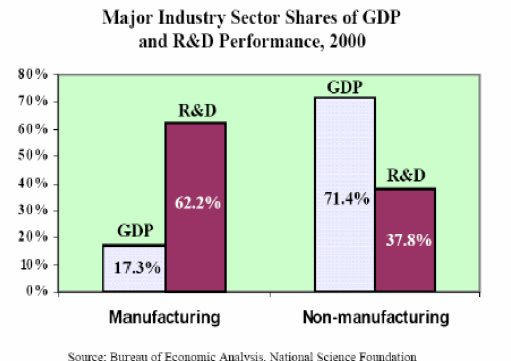Historic Document: Services Science
An IBM Global Team Issue Paper v.1.0
ISSUE
While manufacturing continues to play a vital role in the US economy, it is the service sector that dominates in the production of economic output and employment. Services include everything from professional service workers (medical, financial, consulting, IT) to food service employees, to transportation providers, fitness trainers and manicurists. An increased proportion of the manufacturing activity is linked to services due to outsourcing of information processing functions, supply chain integration, customer support and administrative functions. The common trait is that the product is not tangible—instead it is a service that is performed.
BACKGROUND
Given the prevailing role of services in advanced economies and the mounting global footprint of service activities, a greater research priority should be given to understanding how innovation works in the service sector and how it contributes to national competitiveness and economic growth. Service businesses also need to know more about methodologies for transforming business processes and the necessary integration of processes, technologies, and the people managing and acting upon them. Manufacturing represents just 17% of the US economy, yet we’re devoting nearly two-thirds of our research to it. Over 71% of our economy is represented by services, but we are investing only a 37% of our research investment to it. A better alignment is in order. To know more about this complex subject a new discipline in the services sciences is needed to develop the intellectual basis for solving problems in business process design, organizational transformation, workforce training, integration of services with manufacturing and developing technologies that have the potential to spur entirely new economic growth paths.
IBM POSITION
1. Encourage government R&D funding agencies to address the problems involved in transforming business services and what is required to develop improved innovation models, business methods, innovation performance metrics and the necessary research/technology roadmaps. The effort should be global in scope, multidisciplinary and scientifically rigorous.
2. Support creation of a new academic discipline that combines and is taught in schools of business, engineering and computer science. The approach will require that scientists and business practice and planning intersect.
IBM Leaders: Ginni Rometty, General Manager, BCS
Paul Horn, Senior Vice President, Research
This was originally posted in 2004 (as of 1/1/2012 Ginni Rometty is IBM’s CEO)
URL: http://www.ibm.com/ibm/governmentalprograms/pdf/Issue_Paper_Services_Science_v.1.0.pdf
This was a IBM-hosted Faculty Summit event outcome document from the same time

The original two papers can be found here:
http://web.archive.org/web/20131028203958/http://www.ibm.com/ibm/governmentalprograms/pdf/Issue_Paper_Services_Science_v.1.0.pdf
http://web.archive.org/web/20110106183235/http://www.almaden.ibm.com/asr/resources/facsummit.pdf
Dick Larson (MIT) just sent this:
Larson, R. C., “Operations Research and the Services Industries.” An invited book chapter in Managing Innovation: Cases From the Services Industries, B. R. Guiles and J. B. Quinn (eds). Washington, D.C.: National Academy Press, pp. 115-143, 1988.
Steve Kwan (SJSU) just sent this to access the whole book above:
http://www.nap.edu/openbook.php?record_id=765&page=115
As we prepare for this NSF and UIDP co-sponsored workshop on Research Priorities for Service Science
http://ccss.ucmerced.edu/nsf-workshop/